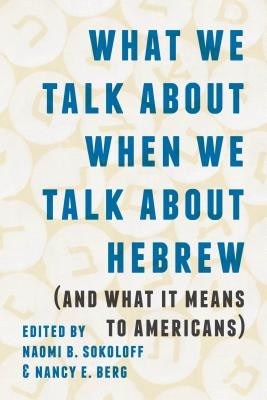
- Išsiųsime per 10–14 d.d.
- Leidėjas: University of Washington Press
- ISBN-10: 029574376X
- ISBN-13: 9780295743769
- Formatas: 15.2 x 22.9 x 1.5 cm, minkšti viršeliai
- Kalba: Anglų
- Extra -20 % nuolaida šiai knygai su kodu ENG20
What We Talk about When We Talk about Hebrew (and What It Means to Americans) + nemokamas atvežimas! | knygos.lt
Atsiliepimai
Aprašymas
Why Hebrew, here and now? What is its value for contemporary Americans? In What We Talk about When We Talk about Hebrew (and What It Means to Americans) scholars, writers, and translators tackle a series of urgent questions that arise from the changing status of Hebrew in the United States. To what extent is that status affected by evolving Jewish identities and shifting attitudes toward Israel and Zionism? Will Hebrew programs survive the current crisis in the humanities on university campuses? How can the vibrancy of Hebrew literature be conveyed to a larger audience?
The volume features a diverse group of distinguished contributors, including Sarah Bunin Benor, Dara Horn, Adriana Jacobs, Alan Mintz, Hannah Pressman, Adam Rovner, Ilan Stavans, Michael Weingrad, Robert Whitehill-Bashan, and Wendy Zierler. With lively personal insights, their essays give fellow Americans a glimpse into the richness of an exceptional language.
Celebrating the vitality of modern Hebrew, this book addresses the challenges and joys of being a Hebraist in America in the twenty-first century. Together these essays explore ways to rekindle an interest in Hebrew studies, focusing not just on what Hebrew means--as a global phenomenon and long-lived tradition--but on what it can mean to Americans.
EXTRA 20 % nuolaida
Kupono kodas: ENG20
Akcija baigiasi už 2d.12:01:16
Nuolaidos kodas galioja perkant nuo 10 €. Nuolaidos nesumuojamos.

- Leidėjas: University of Washington Press
- ISBN-10: 029574376X
- ISBN-13: 9780295743769
- Formatas: 15.2 x 22.9 x 1.5 cm, minkšti viršeliai
- Kalba: Anglų
Why Hebrew, here and now? What is its value for contemporary Americans? In What We Talk about When We Talk about Hebrew (and What It Means to Americans) scholars, writers, and translators tackle a series of urgent questions that arise from the changing status of Hebrew in the United States. To what extent is that status affected by evolving Jewish identities and shifting attitudes toward Israel and Zionism? Will Hebrew programs survive the current crisis in the humanities on university campuses? How can the vibrancy of Hebrew literature be conveyed to a larger audience?
The volume features a diverse group of distinguished contributors, including Sarah Bunin Benor, Dara Horn, Adriana Jacobs, Alan Mintz, Hannah Pressman, Adam Rovner, Ilan Stavans, Michael Weingrad, Robert Whitehill-Bashan, and Wendy Zierler. With lively personal insights, their essays give fellow Americans a glimpse into the richness of an exceptional language.
Celebrating the vitality of modern Hebrew, this book addresses the challenges and joys of being a Hebraist in America in the twenty-first century. Together these essays explore ways to rekindle an interest in Hebrew studies, focusing not just on what Hebrew means--as a global phenomenon and long-lived tradition--but on what it can mean to Americans.




Atsiliepimai